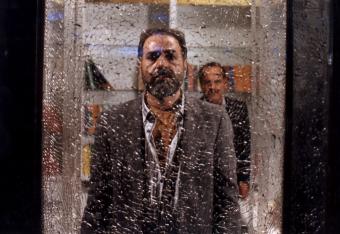 |
Ajanse schischeï Die gläserne Agentur The Glass Agency Ebrahim Hatamikia Iran 1998 Produktion: Varahonar, Farabi Cinema Foundation Weltvertrieb: Farabi Cinema Foundation 55, Sie-Tir Ave, Tehran 11358, Iran Tel. (9821) 6708156, Fax 6708155 e-mail: fcf1@dpi.net.ir Buch: Ebrahim Hatamikia Kamera: Aziz Sa'ati Musik: Majid Entezami Schnitt: Hayde Safiyari Darsteller: Parviz Parastui, Habib Rezai, Reza Kiyaniyan, Qasem Zare Sprache: Farsi Format: 35mm, 1:1.66, Farbe Länge: 100 Minuten, 24 B/sek. |
Kino 7 im Zoo-Palast Mi.17.02.1999 13.30 Delphi-Filmpalast Fr.19.02.1999 21.15 |
|
| Der
Film handelt von den kompromißlosen Versuchen von Haj Kazem, das
Leben eines ehemaligen Kameraden zu retten, der umgehend im Ausland operiert
werden muß, als sich herausstellt, daß sich ein kleiner Granatsplitter
direkt neben seiner Halsschlagader befindet. Dazu benötigt er aber
ein Flugticket, das nicht einfach zu bekommen ist. Nachdem die Methode
der Überzeugung nicht zum Ziel führt, entschließt sich
Haj Kazem, die Kunden eines Reisebüros als Geiseln zu nehmen... "Die
gläserne Agentur verdeutlicht die unterschiedlichen politischen Strömungen
in der iranischen Gesellschaft. Auf der einen Seite porträtiert der
Film mit Haj Kazem einen idealistischen und extremistischen Basiji (Mitglied
der Freiwilligen Truppen), der auf keinen Fall bereit ist, seine ehrlichen
Überzeugungen politischen Interessen zu opfern. Auf der anderen Seite
zeigt er eine Figur wie Oberst Salahshoor, der die Machthaber repräsentiert
und besessen davon ist, sich für Ordnung, Sicherheit, Gesetz, Politik,
Ethik und Religion als charakteristische Züge einer zivilen Gesellschaft
einzusetzen. Der Oberst macht sich Sorgen über die Folgen von Kazems
Handeln, während dieser die Werte der Revolution zu erhalten versucht." Antonia Shoraka |
The latest film directed
by Ebrahim Hatamikia was the most salient entry of the 16th International
Fajr Film Festival and obtained eight prizes – the highest number
this year – from the jury. It is the first serious film which critically
depicts the country's status quo. As such, it can serve as a useful
model for the production of other films which cast a critical eye on
the country's social and political conditions. The Glass Agency is the
story of a violent attempt by a pain-stricken Basiji (a member of the
volunteer forces) to save the life of his former comrade who is suffering
from a piece of mortar shell in the jugular vein of his neck, and who
should immediately be dispatched abroad for vital surgery. To do so,
he needs an airplane ticket which is apparently not so easy to obtain.
By taking ordinary people inside a travel agency as hostages, the Basiji
ultimately reaches his objective of getting tickets, and boards the
airplane, but… Moreover, the film reflects the current differences
in political points of views in the present day Iranian community which
indicates that a new atmosphere exists in the country. The film portrays
an idealistic and extremist Basiji who is in no way ready to dispense
with his true values for the benefit of some political interests. On
the other hand, the film shows Colonel Salahshoor who represents the
ruling system, and who is obsessed with promoting order, security, law,
politics, ethics, and religion as characteristic features of civil society.
The Colonel is concerned with the global repercussions of what Haj Kazem
has done, while Haj Kazem is striving to preserve the values of the
revolution. |
| Biofilmographie
/ Biofilmography Ebrahim Hatamikia wurde 1961 geboren. Er studierte Drehbuchschreiben am College of Cinema and Theatre. Mit Ausbruch des Krieges schloß er sich einer Gruppe an, die an der Front den Film The Chronicle of Victory drehte. 1987 entstand sein erster abendfüllender Spielfilm. Ebrahim Hatamikia war born in 1961. He graduated from the College of Cinema and Theatre with a degree in screenwriting. He began filmmaking at the outbreak of the war between Iran and Irak and joined a team which was shooting The Chronicle of Victory at the battle fronts. He shot his first full-length feature film, The Identity, in 1987. Films / Filme 1982: Blinds of Heart (short film). 1983: The Sacred Earth (short film). 1984: The Path (short film). 1985: The Red Carcanet (short film). 1987: The Identity. 1988: Aqa Saeed (documentary, medium length). 1989: The Scout. 1990: The Immigrant. 1991: Union of the God. 1992: From Karkhe to Rhine. 1994: The Green Ashes. 1996: The Scent of Joseph's Shirt; The Minoo Tower. 1998: AJANSE SCHISCHEï. |
|